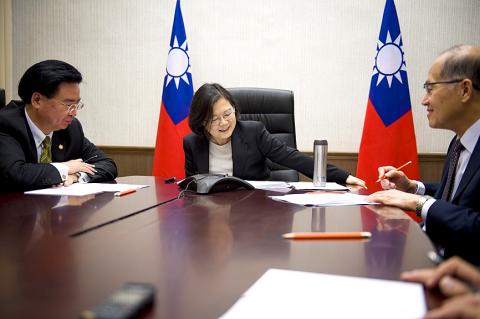President Tsai Ing-wen (蔡英文) and US president-elect Donald Trump spoke over the telephone on issues relating to improving the economy and strengthening national defense, the Presidential Office said yesterday.
The conversation, which the Presidential Office said took place at 11pm on Friday and lasted slightly longer than 10 minutes, was the first publicly reported call between a US president or a president-elect and a Taiwanese leader since 1979, when Washington switched diplomatic recognition from Taipei to Beijing.
Tsai congratulated Trump on his victory in the closely contested US presidential election and said she believed he would make an excellent president, the Presidential Office said in a news release, which added that Tsai also conveyed to Trump the hope that the US would support Taiwan making more contributions to and having more participation in international issues.

Photo provided by the Presidential Office
National Security Council Secretary-General Joseph Wu (吳釗燮), Minister of Foreign Affairs David Lee (李大維) and two other presidential aides were present during the conversation, the news release said.
Tsai and Trump talked about their views and ideals on governance, especially on promoting domestic economic development and strengthening national defense to ensure a better, safer life for the public, it said.
The two leaders also briefly exchanged views on the situation in Asia, it added.
On Taiwan-US relations, Tsai expressed the hope of boosting bilateral exchanges and contacts and establishing closer cooperation, it said.
Presidential Office spokesman Alex Huang (黃重諺) confirmed that it was Tsai who made the call to Trump following a pre-arranged procedure.
While he declined to give other details about the arrangement, a source familiar with the matter said that Edwin Feulner, founder of the Washington-based Heritage Foundation, played a key role in setting up the call.
Feulner, in Taipei in October, joined the Trump team in August, according to US media reports.
Trump also took to Twitter about the call.
The US president-elect tweeted: “The President of Taiwan CALLED ME today to wish me congratulations on winning the Presidency. Thank you!”
The traditional US diplomatic formulation for referring to Taiwan’s leader is “the president on Taiwan.”
In a second tweet Trump wrote: “Interesting how the U.S. sells Taiwan billions of dollars of military equipment but I should not accept a congratulatory call.”
US President Barack Obama’s White House said the outgoing US administration had not changed its stance.
“There is no change to our longstanding policy on cross-strait issues,” US National Security Council spokeswoman Emily Horne said.
“We remain firmly committed to our ‘One China’ policy,” she added. “Our fundamental interest is in peaceful and stable cross-strait relations.”
Additional reporting by AFP and The Guardian

Seventy percent of middle and elementary schools now conduct English classes entirely in English, the Ministry of Education said, as it encourages schools nationwide to adopt this practice Minister of Education (MOE) Cheng Ying-yao (鄭英耀) is scheduled to present a report on the government’s bilingual education policy to the Legislative Yuan’s Education and Culture Committee today. The report would outline strategies aimed at expanding access to education, reducing regional disparities and improving talent cultivation. Implementation of bilingual education policies has varied across local governments, occasionally drawing public criticism. For example, some schools have required teachers of non-English subjects to pass English proficiency

‘FORM OF PROTEST’: The German Institute Taipei said it was ‘shocked’ to see Nazi symbolism used in connection with political aims as it condemned the incident Sung Chien-liang (宋建樑), who led efforts to recall Democratic Progressive Party (DPP) Legislator Lee Kun-cheng (李坤城), was released on bail of NT$80,000 yesterday amid an outcry over a Nazi armband he wore to questioning the night before. Sung arrived at the New Taipei City District Prosecutors’ Office for questioning in a recall petition forgery case on Tuesday night wearing a red armband bearing a swastika, carrying a copy of Adolf Hitler’s Mein Kampf and giving a Nazi salute. Sung left the building at 1:15am without the armband and apparently covering the book with a coat. This is a serious international scandal and Chinese

PERSONAL DATA: The implicated KMT members allegedly compiled their petitions by copying names from party lists without the consent of the people concerned Judicial authorities searched six locations yesterday and questioned six people, including one elderly Chinese Nationalist Party (KMT) member and five KMT Youth League associates, about alleged signature forgery and fraud relating to their recall efforts against two Democratic Progressive Party (DPP) legislators. After launching a probe into alleged signature forgery and related fraud in the KMT’s recall effort, prosecutors received a number of complaints, including about one petition that had 1,748 signatures of voters whose family members said they had already passed away, and also voters who said they did not approve the use of their name, Taipei Deputy Chief Prosecutor

TRADE: The premier pledged safeguards on ‘Made in Taiwan’ labeling, anti-dumping measures and stricter export controls to strengthen its position in trade talks Products labeled “made in Taiwan” must be genuinely made in Taiwan, Premier Cho Jung-tai (卓榮泰) said yesterday, vowing to enforce strict safeguards against “origin laundering” and initiate anti-dumping investigations to prevent China dumping its products in Taiwan. Cho made the remarks in a discussion session with representatives from industries in Kaohsiung. In response to the US government’s recent announcement of “reciprocal” tariffs on its trading partners, President William Lai (賴清德) and Cho last week began a series of consultations with industry leaders nationwide to gather feedback and address concerns. Taiwanese and US officials held a videoconference on Friday evening to discuss the